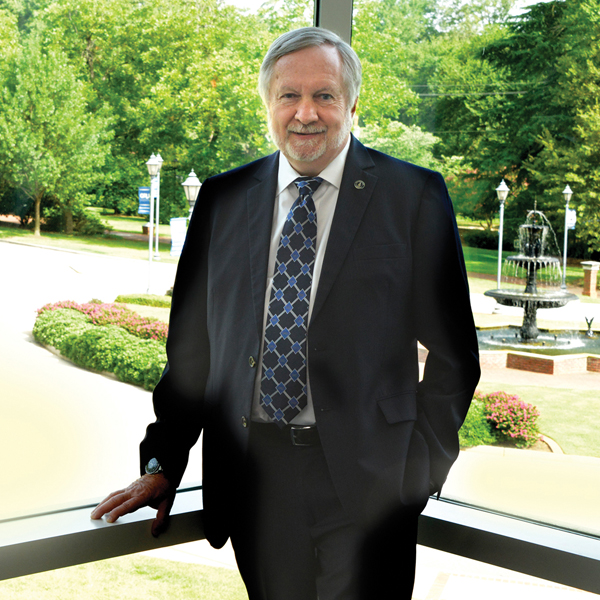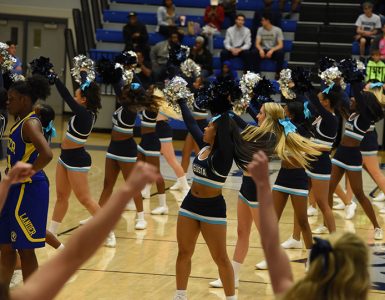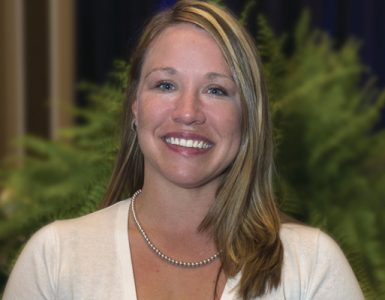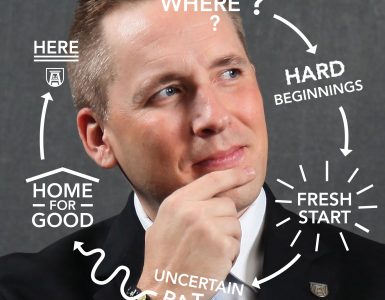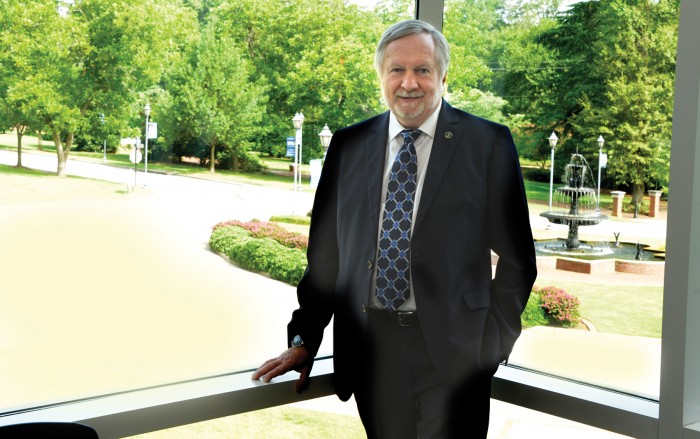
New president Brooks Keel is bullish on the university he leads.
It’s 10:30 a.m. on Friday, Sept. 18, and President Brooks Keel is in his office in the Kelly Administration Building on the Health Sciences Campus getting ready to be interviewed about the Board of Regents’ decision on Tuesday to rename the school that hired him Augusta University.
Keel recognizes the significance of the moment and is upbeat and unphased. Nevermind that all this comes less than two months after the same Board of Regents unanimously voted to make him Georgia Regents University’s second president – Keel is ready to make this work.
“There are some huge advantages to being Augusta University,” he says. “This university is a statewide, region wide, nationwide, worldwide university, and that’s going to take place regardless of what the name is. But to have the word Augusta in the name really helps build the partnership of where we live, where we spend most of our time, which is right here in Augusta.”
There was certainly excitement. Before he’d even left the Board of Regents meeting in Atlanta, parts of Jaguar Nation were already making changes to their social media accounts and inquiring about new letterhead.
However, the university is committed to a planned and orderly transition, which means full implementation is months down the road. “This will be a process,” Keel says. “There are a tremendous number of moving parts.”
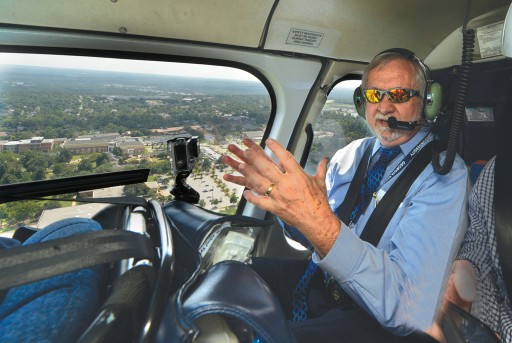
Keel returned to the city where he was born and the two institutions where he received his degrees with the reputation of being a straight shooter, and in his short time on campus, he’s lived up to it. Known for his love of students and his ability to get things done, the private man is just as compelling — an avid scuba diver with a love of science fiction and sports.
In short, he was the perfect choice to lead his hometown university.
The Past is Prologue
It was 1978 when Keel received his diploma from then-Augusta College, and 1982 when he earned his PhD in reproductive endocrinology from the Medical College of Georgia. There’s been a lot of water under the institution’s bridge since then — no one would argue with that — but Keel says he’s surprised at the impact of all that water. Instead of the erosion he expected to find, he found the continuity and power that comes with flow.
“When you take two institutions and put them together like that, there’s a real tendency from both sides to dig their heels in and say, ‘Hey — I’m not going to accept this,’ and then find reasons for it not to work,” he says. “But I’ve not found that here, and that’s probably been the biggest, most pleasant surprise I’ve had. The faculty here appreciate each other.”
What he’s found are two distinct campuses that are finding ways of working together; two campuses eager to find more common ground. One, a leading health sciences campus, is similar to the one where he cut his professorial teeth, and the other, an established undergraduate campus, shares much with Georgia Southern University, the school he just left.
“I really do believe that the 30 years or so of my career has set me up for this particular position,” he says, and a quick glance at his CV confirms it.
Sixteen years at the University of Kansas School of Medicine-Wichita, an academic medical center, gave him an appreciation for what he’s taken on as CEO of the health system. There, he had his own lab, so he’s no stranger to the ins and outs of biomedical research as well, such as what it’s like to have to apply for, receive and renew an NIH grant. In fact, expanding the institution’s research profile is one of his top priorities.
Going to Florida State as associate vice president for research and then to Louisiana State University as vice chancellor for research and economic development got him to the comprehensive university campus — the kind of place that has everything from 18-year-old freshmen to medical, dentistry and law students — and his subsequent Georgia Southern presidency gave him a crash course in just how an undergraduate campus really works.
“It’s a totally different beast,” he says. “Being at Georgia Southern really gave me the chance to interact with the quintessential college student, and if you can’t get excited about that, you really are in the wrong business.”
It was precisely that experience, he says, that sold him on the opportunity presented by being back in Augusta.

A Community Leader
Keel, who has been active in economic development throughout most of his career, is a firm believer in the idea that the trajectories of Augusta and the university are inextricably linked. You see him everywhere — Rotary meetings, Arts in the Heart, eating on Broad Street — and he’s meeting with community leaders to determine the areas of common ground.
Cyber, of course, is one. With Fort Gordon now home to the U.S. Army Cyber Command and the U.S. Army Cyber Center of Excellence, the creation of the university’s Cyber Institute makes a lot of sense, but there are plenty of other places the school intersects the community, especially when it comes to the health sciences. Being home to the state’s only public medical school and only dental school and being so strong in allied health and nursing helps Augusta become a natural magnet for business and industry.
When interviewing for the president’s job, Keel was able to clarify this philosophy by making an example out of Regent Don Waters, president of Brasseler USA®, a Savannah company that makes medical and dental surgical instruments.
“If he’s not thinking about expanding his business or relocating his business here, especially if he’s thinking about moving into an R&D function, then we’re not doing our job,” Keel told them. “Anybody who’s making anything that’s going to be used in medical, dental, allied health or nursing needs to be thinking, ‘Wow — wouldn’t it be cool to come to Augusta and be right next door?’”
And while economic development discussions frequently focus on the health sciences and cyber, which Keel calls one of the school’s marquee programs the way football was at Georgia Southern, he continues to bring the conversation back to Summerville, especially to the arts opportunities that flourish there.
At the Faculty Kickoff in August, Keel spoke forcefully about looking forward to personally experiencing the university’s arts in all its forms, and a few weeks later was enjoying himself at the annual Art Faculty Exhibition, rubbing elbows with members of the Art Department and moving through the Mary S. Byrd Gallery with obvious interest.
“Art does bring a quality of life that you can’t find in any other major area,” he says. “But even more than providing that culture, it provides a different way of looking at things. Creativity fuels innovation, and innovation is what drives commercialization.”
At LSU, where the director of the high performance computing center was a music professor who was using the Wii to design a different type of music, Keel was instrumental in bringing video game giant EA Sports to campus in a unique public/private partnership that actually put EA Sports in the same building as many of the campus computer programs.
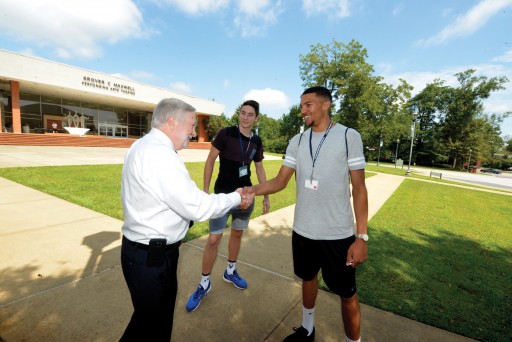
“EA Sports came to LSU not just because of high performance computing and electrical engineering, it came because of the incredibly strong music and arts program,” he says. “Because if you’re going to be developing video games, it all works together.”
And that’s not just lip service. Keel’s appreciation for art itself goes beyond his daughter’s “My Dad the Scientist” drawing that’s now up in his office, something he uncovered during the move. Art, specifically photography, plays a central role in his personal life as well. His wife, Dr. Tammie Schalue, an off-site lab director and an administrator for an association management firm, is an accomplished, though Keel says modest, underwater photographer. In fact, the screensaver on his office computer monitor flashes distracting evidence of her skill.
The two are both certified scuba instructors, which appeals to his love of the outdoors, though he says Tammie is much more of a thrill seeker than he is. Actually, had the couple stayed in Statesboro, she would have had the opportunity to do a tandem jump with the U.S. Army Golden Knights parachute team.
“She almost said we had to postpone the job so she could do it,” Keel laughs.
Outside of diving, most of Keel’s thrill seeking comes vicariously through the books he reads. A science fiction fan, he also has an interest in the early space program, particularly the Mercury through Apollo years, where the astronauts were either “completely insane or incredibly courageous, and probably a little bit of both.”
When it comes to diving, though, he’s all about participation. Though his return to Augusta kept the couple from going to the ocean this summer, they continue to plan most of their trips around diving.
Favorite dives — they’re asked that a lot — include Cozumel for its drift diving and the surrounding Mayan culture, Bonaire for its shore diving and Grand Cayman for a funky little diver’s hotel they discovered that’s right on the ocean.
They like diving so much, in fact, that they made a dive trip out of their Hawaiian honeymoon. It was also in Hawaii that they participated in one of their most impressive adventures — a night dive with manta rays.
“It was one of the most otherworldly things you can do and not leave this earth,” he says. “To be on the ocean floor and have these manta rays with their 15-foot wingspan dive down toward you and to see their mouths open up as they pass by is quite an experience. You hold up your light, which attracts the krill, and then they just swoop down and actually scrape your head when they go over.”
Though he suspects they won’t be able to find the time to get away again until after the first of the year, he says he’s really okay with that. Exploring Twin Gables, the historic house in Summerville where presidents have traditionally lived, has been its own kind of adventure.
At Home
“We had a condo for a year in Statesboro that was upstairs/downstairs, but other than that, we’ve always been on a single floor, so dealing with four floors has been a challenge,” he says. “But Tammie keeps telling me — and I keep reminding myself — that it’s healthy to go up and down steps.”
Here, he stops and shakes his head.
“We go up and down those steps a heck of a lot,” he
sighs, smiling.
Steps or no steps, he’s anxious to show off the 100-year-old house to his daughter, a fashion designer for Anthropologie, who recently told him she was looking at an older house of her own in Philadelphia.
[su_pullquote align=”right”]Keel returned to the city where he was born and the two institutions where he received his degrees with the reputation of being a straight shooter, and in his short time on campus, he’s lived up to it.[/su_pullquote]
Not long before the name change was announced, he was still unpacking. Moving is never easy, even for a president and his wife, but at least the Keels had a little muscle waiting for them in the form of their son, Preston, who along with two of Keel’s nieces, was already on campus. A pharmacy tech, Preston helped empty boxes and acted as a tour guide, showing off an Augusta that has changed a lot since the days when Keel and his father, a mechanic with the railroad who ended up as a maintenance supervisor at Columbia Nitrogen, were squaring off over his long hair.
If you haven’t seen the photo of Keel as an incoming Augusta College freshman, it’s worth a trip to the Internet. The year was 1974, and fathers everywhere were at odds with their long-haired sons.
“I actually learned a lot from how he dealt with me as an 18-year-old,” Keel says. “He made it plain that he did not like my hair, but he was never embarrassed to introduce me, and that really impressed me.”
Whatever his father’s misgivings, the long hair certainly didn’t impede Keel’s progress. While at Augusta College, he rose to become president of Pi Kappa Phi, the fraternity that was central to forming the man and leader he would become.
“When you get to be president — the term is archon in Pi Kappa Phi — you learn a lot about managing people and managing business,” he says. “It was a great learning experience, and I made a lot of great friendships there, too.”
What leisure time he has might be spent watching “House of Cards” or exploring the grounds at Twin Gables, but possibly his favorite way to unwind is attending collegiate athletic events. While the school he’s taken over does not have the sport he is most closely associated with, he nevertheless plans to make athletics a cornerstone of his administration.
It’s not just fun, he says, it’s important. Especially here.
“I think we need to find ways to engage a lot of the folks who work here, because even though Augusta College and Augusta State always had these programs, the Health Sciences Campus hasn’t really felt like it was theirs,” he says. “I think you’re going to see more and more people get behind our athletics program.”
And just to be clear, by athletics program, he does not mean football.
“We’re not going to have football here,” he says. “Put that on the table right now. We’re not going to start a football team.”
What are options, however, are existing programs like golf, a back-to-back Division I national champion and perennial contender; men’s basketball, which has established itself as a preeminent Division II powerhouse; and women’s volleyball, which is coming off the best season in the program’s history. And there are new programs currently being discussed that could further raise the stature of the school and the strength of the fan base.
Keel believes the more opportunities people both inside and outside the institution have to experience student athletics, the more the university will become a recognized and respected brand, and having Augusta in the name certainly grounds it in a location.
“We are still one university, and the name is not going to change that,” he says. “People come to this university not because of what it’s called, but because of the great programs we have to offer and the
great faculty and staff we have that provides
that education and that health care
and that service.”
There will be many more interviews about the name change, of course. It’s a process, as he’s said, and for the time being, one with more questions than answers.
But he’s comfortable with answering the big question, the one that really matters.
“Knowing this community, having been born and raised here and having watched the growth of the community for 59 years of my life now, I just see it as a great opportunity to take all the wonderful things that the merger has brought to the table and now really get the community behind it in a very meaningful way,” he says. “It truly does indicate that the sky’s the limit.”

